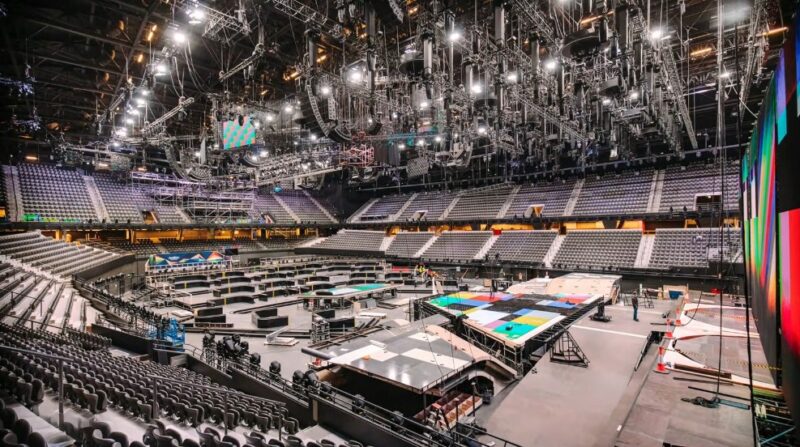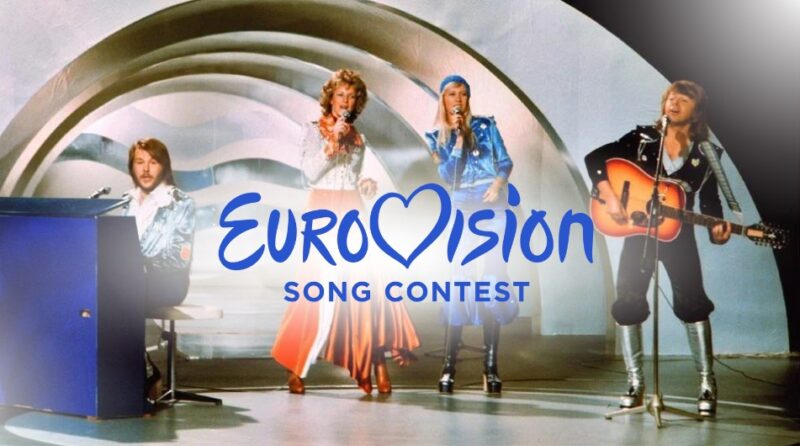The Eurovision Song Contest, a spectacle of music and cultural diversity, has been a staple of international entertainment since its inception in 1956. Conceived in the post-war era as a means to unite nations through the universal language of music, it has grown into one of the longest-running and most-watched annual music competitions in the world.
The significance of this contest extends beyond its entertainment value. It serves as a vibrant platform for cultural exchange, a launchpad for artists, and a mirror reflecting the socio-political dynamics of the times.
From its humble beginnings with just seven participating countries to its current grandeur featuring over 40 nations, Eurovision’s journey is a fascinating tale of music, history, and cultural evolution.
The Inaugural Eurovision Song Contest (1956)
The Contest was born out of a desire to unite a continent ravaged by war. The European Broadcasting Union (EBU), an alliance of public service media organizations, conceived the idea of a pan-European music competition.
The inaugural contest took place in Lugano, Switzerland, in 1956, with seven countries participating. The first Eurovision was a far cry from the extravagant spectacle we know today. Each country presented two songs, and the voting was done by a jury of experts from each participating country.
The winner was Switzerland’s Lys Assia with the song “Refrain.” Despite its modest beginnings, the contest laid the foundation for a tradition that would grow in scale, popularity, and cultural significance in the years to come.
The rules of the contest have evolved over the years, but the core principle of bringing nations together through music has remained constant. From its inception, Eurovision has been a celebration of diversity and unity, a stage where countries express their identity through song and compete in a spirit of friendly rivalry.
Early Years (1957-1969)
The early years of Eurovision saw the contest gradually expanding its reach and refining its format. More countries joined the competition, and the rule allowing each country to present two songs was replaced by the one-song-per-country format we know today.
These years also saw the introduction of the iconic voting system, where each country awards points to other countries’ songs. In the late 1950s and 1960s the contest was a showcase of ballads and chansons, reflecting the popular music styles of the era.
Memorable winners from this period include France’s Jacqueline Boyer with “Tom Pillibi” in 1960 and the United Kingdom’s Sandie Shaw with “Puppet on a String” in 1967. Despite its growing popularity, Eurovision was not without controversy.
The 1969 contest ended in a four-way tie between the United Kingdom, Spain, the Netherlands, and France, leading to disputes over the voting system. This incident prompted changes in the rules to ensure a clear winner in future contests.
The Impact of Political and Social Changes (1970-1979)
The 1970s was a decade of significant political and social changes, and these shifts were reflected in Eurovision. The contest became a platform for countries to express their political sentiments, leading to some memorable and controversial moments.
In 1974, the Portuguese entry “E Depois do Adeus” served as a secret signal to start the Carnation Revolution against the country’s dictatorship. The same year, ABBA’s win for Sweden with “Waterloo” catapulted the group to international fame and marked the beginning of Eurovision’s influence on pop music.
The decade also saw the introduction of the “preview video” concept, where viewers could see a clip of each song before the live performance. This innovation, along with the growing use of elaborate stage designs and costumes, added a new level of spectacle to the contest.
Evolution in the 1980s
The 1980s brought further changes to the contest, both in terms of its format and its cultural impact. The contest embraced the era’s pop music trends, resulting in a shift from traditional ballads to more upbeat, contemporary songs.
The use of backing tracks was allowed, and the performances became more dynamic and visually engaging. The decade saw several memorable winners, including Bucks Fizz for the United Kingdom with “Making Your Mind Up” in 1981 and Celine Dion for Switzerland with “Ne partez pas sans moi” in 1988.
These victories underscored Eurovision’s role in launching the careers of successful artists. The 1980s also marked the beginning of Eurovision’s expansion beyond Europe. Israel’s participation and subsequent wins in 1978 and 1979 paved the way for other non-European countries to join the contest, broadening Eurovision’s cultural and geographical scope.
New Era (1990-1999)
The fall of the Iron Curtain in the late 1980s and early 1990s had a profound impact on this contest. Many Eastern European countries joined the contest, bringing new musical styles and languages to the Eurovision stage. This influx of new participants made the competition more diverse and competitive.
The 1990s also saw some of the most iconic and controversial moments in Eurovision history. In 1998, Dana International, a transgender woman representing Israel, won the contest with “Diva,” making a powerful statement for LGBTQ+ visibility and acceptance.
Despite these milestones, Eurovision faced challenges during this period. The increasing number of participants led to concerns about the contest’s length and the fairness of the voting system. These issues prompted further changes in the contest’s format, including the introduction of semi-finals in the following decade.
Digital Age (2000-2009)
The advent of the internet and digital media in the 21st century transformed Eurovision. The contest’s reach extended beyond the television screen, with fans around the world engaging with the contest through social media, online voting, and live streaming.
The 2000s saw a diverse range of winners, from Latvia’s Marie N with “I Wanna” in 2002 to Finland’s hard rock band Lordi with “Hard Rock Hallelujah” in 2006. These victories showcased the wide range of musical styles represented in the contest.
The decade also had its share of controversies. The 2003 contest saw a political dispute when Russia’s t.A.T.u. finished third behind Turkey and Belgium, leading to accusations of political voting. These incidents sparked debates about the voting system and the influence of politics on the contest.
Eurovision’s Expanding Influence (2010-2019)
The 2010s saw Eurovision’s influence expanding beyond Europe. The contest’s global fan base grew, with broadcasts reaching as far as Australia, which joined the competition in 2015. Eurovision parties became a global phenomenon, and the contest’s influence on pop culture continued to grow.
The contest also emerged as a powerful platform for LGBTQ+ visibility and acceptance. Conchita Wurst’s victory for Austria in 2014 with “Rise Like a Phoenix” was a significant moment for the contest and the LGBTQ+ community.
The decade also saw some of the most memorable performances in Eurovision history, from Loreen’s “Euphoria” for Sweden in 2012 to Salvador Sobral’s “Amar pelos dois” for Portugal in 2017. These performances showcased the diversity and creativity that define Eurovision.
Unforgettable Moments
The contest’s history is filled with unforgettable moments that have captivated audiences worldwide. From ABBA’s breakthrough win in 1974 to Conchita Wurst’s triumphant performance in 2014, these moments have defined the contest and left a lasting mark on viewers.
The contest has also seen its share of controversies and scandals. The four-way tie in 1969, the political disputes in the 2000s, and the various rule changes have sparked debates and made headlines. These incidents have added an extra layer of drama and intrigue to the contest.
Eurovision’s unforgettable moments extend beyond the performances and controversies. The heartfelt speeches, the camaraderie among the artists, and the spirit of unity and celebration that permeates the event all contribute to the magic of Eurovision.
Behind the Scenes: Organization of the Contest

As the world’s largest music competition, the organization of Eurovision entails an array of complex tasks, from selecting the ideal host city and venue to managing the intricate logistics of the live broadcast.
The process commences well in advance, with the winning country from the previous year assuming the responsibility of hosting the upcoming contest. One of the primary challenges is identifying a suitable venue capable of accommodating the massive production and enthusiastic audience.
The selected venue must have state-of-the-art facilities, ample seating capacity, and be fully equipped to handle the technical demands of the event. Once the venue is secured, the host country’s broadcasting network takes center stage.
The host broadcaster is tasked with overseeing all aspects of the event’s production, ensuring smooth execution from start to finish. This includes designing the theme and visual aesthetics of the contest, creating captivating graphics, and developing enthralling opening and interval acts that showcase the host country’s culture and creativity.
In the months leading up to the grand event, the organizing team works tirelessly to handle the myriad logistical challenges. This includes coordinating the arrival and accommodations of the participating delegations, which can comprise a considerable number of artists, backup performers, choreographers, and crew members.
Rehearsals are meticulously scheduled to allow each country’s delegation sufficient time on stage to perfect their performances and technical elements. The pressure mounts as the contest date approaches. Technical experts collaborate to ensure that all sound, lighting, and video elements are flawlessly integrated.
Every detail, no matter how small, is scrutinized to guarantee a seamless and captivating broadcast watched by millions worldwide. While the organization of the contest is undoubtedly a monumental task, it is also an opportunity of immense pride and prestige for the host country.
Hosting this iconic competition provides a unique platform to showcase the nation’s rich cultural heritage, artistic flair, and warm hospitality to an international audience. The event often becomes a celebration of the host country’s identity, and the positive exposure can leave a lasting impression on viewers from all corners of the globe.
Moreover, hosting Eurovision can lead to significant economic and tourism benefits for the host city and country. The influx of tourists, media coverage, and the attention drawn to local attractions can boost tourism and promote a favorable image of the host nation on the global stage.
Impact on Music and Artists
The Eurovision Song Contest has left an indelible mark on the world of music and has played a pivotal role in shaping the careers of numerous artists. The success stories are numerous, and some of the most iconic names in the music industry owe their breakthrough to Eurovision.
ABBA, the Swedish pop sensation, is perhaps one of the most celebrated examples. Winning the Eurovision Song Contest in 1974 with their unforgettable hit “Waterloo,” ABBA’s victory opened doors to international fame, making them one of the best-selling music acts in history.
Similarly, the talented Canadian singer Celine Dion owes a significant part of her success to Eurovision. Representing Switzerland in 1988, she emerged as the winner with her powerful performance of “Ne partez pas sans moi.” This achievement marked the beginning of her illustrious journey as a global superstar.
Over the years, Eurovision has continued to be a platform for emerging artists to showcase their talents and connect with audiences worldwide.
Recent sensations like Loreen, the Swedish singer who won both in 2012 and 2023, and Conchita Wurst, the Austrian drag artist who captivated audiences with “Rise Like a Phoenix” in 2014, are prime examples of how the contest has nurtured new talent and propelled them into the limelight.
Beyond launching careers, Eurovision has had a profound influence on the music industry’s trends and styles. The diverse range of songs and performances presented at the contest reflects the ever-evolving musical tastes and cultural nuances across Europe and beyond.
The competition embraces an array of genres, from pop and rock to traditional folk and contemporary dance, allowing artists to experiment with different sounds and expressions. Moreover, Eurovision serves as a platform for cultural exchange and mutual appreciation among nations through the universal language of music.
Every year, participating countries present their unique musical identities, bringing to the forefront their rich traditions, stories, and customs. This fosters a sense of unity among nations, transcending geographical and political boundaries.
The Future of Eurovision
As the contest enters its seventh decade, its future looks bright. With advances in technology and changes in media consumption, Eurovision is likely to continue evolving and adapting to the times.
The role of digital media and online engagement is set to grow, with social media, live streaming, and online voting playing an increasingly important role in the contest. The inclusion of more countries, including those outside Europe, may further broaden the contest’s cultural diversity and global reach.
At its heart, the contest is a celebration of music, diversity, and unity. It’s a stage where nations come together to compete in a spirit of friendly rivalry and mutual respect, united by their love for music.
FAQs:
What is the “Big Four”?
The “Big Four” refers to the four largest financial contributors to the European Broadcasting Union (EBU): Germany, France, the United Kingdom, and Spain. They are automatically qualified for the Eurovision final each year.
What leads to the disqualification of a country’s entry in the Contest?
Countries can be disqualified from the Contest if they violate the rules and regulations set by the EBU, such as releasing their song before the allowed date or not meeting eligibility criteria.
How do countries choose their representatives ?
Each participating country has its own selection process, which can involve national competitions, internal selections, or a combination of both.
What was the first Eurovision Song Contest after the fall of the Berlin Wall?
The first Contest after the fall of the Berlin Wall was held in 1990 in Zagreb, Yugoslavia.
Which country refused to host it in 1970, leading to a one-year hiatus in the competition?
The Netherlands declined to host the Contest in 1970, resulting in a break in the contest that year.
Conclusion
From its humble beginnings in 1956 to its current status as a global cultural phenomenon, Eurovision’s journey is a testament to the power of music to bring people together. The contest has evolved with the times, reflecting the changing political, social, and cultural landscapes of its era.
Its impact extends beyond the music. It has launched careers, influenced pop culture, and served as a platform for cultural exchange and social commentary. Despite the controversies and debates, the spirit of unity and celebration that defines the contest continues to resonate with audiences worldwide.
As we look back on Eurovision’s rich history, we also look forward to its future. I can’t wait to see what Sweden will prepare for us this time.

